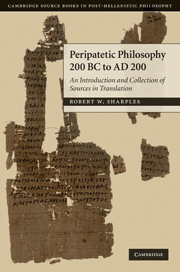Book contents
- Frontmatter
- Contents
- Preface
- Abbreviations
- Introduction
- Individuals
- Logic and ontology
- Chapter 7 The Categories
- Chapter 8 The Categories
- Chapter 9 The Categories
- Chapter 10 The Categories
- Chapter 11 On Interpretation
- Chapter 12 Ontology
- Chapter 13 Logic
- Chapter 14 Theory of knowledge
- Ethics
- Physics
- Bibliography
- Index of sources
- Index of passages cited
- Index of personal names (ancient)
- General index
Chapter 13 - Logic
Published online by Cambridge University Press: 05 June 2012
- Frontmatter
- Contents
- Preface
- Abbreviations
- Introduction
- Individuals
- Logic and ontology
- Chapter 7 The Categories
- Chapter 8 The Categories
- Chapter 9 The Categories
- Chapter 10 The Categories
- Chapter 11 On Interpretation
- Chapter 12 Ontology
- Chapter 13 Logic
- Chapter 14 Theory of knowledge
- Ethics
- Physics
- Bibliography
- Index of sources
- Index of passages cited
- Index of personal names (ancient)
- General index
Summary
Apuleius, On Interpretation 13.193.16–20
However, Ariston of Alexandria and some of the more recent Peripatetics add five other moods besides those with a universal conclusion (three in the first figure and two in the second), in place of which they infer particular [conclusions]. But it is completely absurd to conclude less when more is granted [i.e. to have a conclusion weaker than the premisses allow].
Aratus, Philosophy, in Paris, suppl. gr. 645 fol. 197r., ed. C. Kalbfleisch, Jahrbuch f. d. klassische Philologie suppl. 23, 1897, 707
(1) Problem: that there should be another syllogistic figure, in addition to these [three], seemed impossible to Aristotle and his associates. For it is impossible that, among three terms, the middle term should be arranged in relation to the two extremes in any other relation besides those stated. Theophrastus [93 FHS&G] and Eudemus [fr. 18 Wehrli 1969a] added certain other combinations to the first figure besides those set out by Aristotle; and about these we will speak in what follows. Some of the more recent [thinkers] thought that these constituted a fourth figure, referring the doctrine to Galen as its father. To establish this they use an argument like the following: if it is possible for the middle term to be arranged in relation to the extremes in some other relation besides those stated, there will also be another figure of the syllogism besides those that have been stated. But the first: therefore the second. (2) The minor [premiss of their argument] is shown [as follows]: it is possible for the middle term, in the reverse way to the first figure, to be predicated of the major term, and to be the subject of the minor, for example: ‘every human being is an animal; every animal is a substance; so some substance is a human being.’ The major term is ‘human being’, because it is the predicate in the conclusion, and the minor [term] is substance, because it is the subject in [the conclusion]; and ‘animal’, which is the middle term, is predicated of ‘human being’ [in the major premiss], but is the subject [in the minor premiss] of ‘substance’, which is the minor term.
- Type
- Chapter
- Information
- Peripatetic Philosophy, 200 BC to AD 200An Introduction and Collection of Sources in Translation, pp. 90 - 100Publisher: Cambridge University PressPrint publication year: 2010



